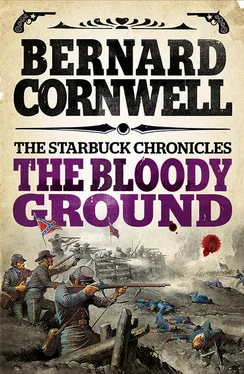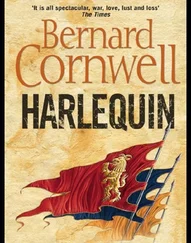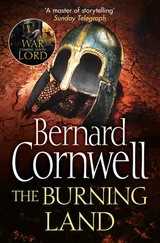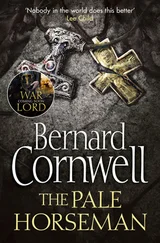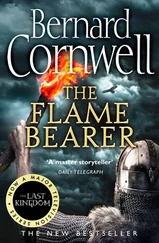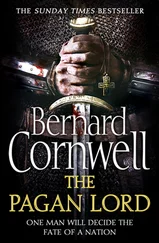Bernard Cornwell - The Bloody Ground
Здесь есть возможность читать онлайн «Bernard Cornwell - The Bloody Ground» — ознакомительный отрывок электронной книги совершенно бесплатно, а после прочтения отрывка купить полную версию. В некоторых случаях можно слушать аудио, скачать через торрент в формате fb2 и присутствует краткое содержание. Жанр: unrecognised, на английском языке. Описание произведения, (предисловие) а так же отзывы посетителей доступны на портале библиотеки ЛибКат.
- Название:The Bloody Ground
- Автор:
- Жанр:
- Год:неизвестен
- ISBN:нет данных
- Рейтинг книги:4 / 5. Голосов: 1
-
Избранное:Добавить в избранное
- Отзывы:
-
Ваша оценка:
- 80
- 1
- 2
- 3
- 4
- 5
The Bloody Ground: краткое содержание, описание и аннотация
Предлагаем к чтению аннотацию, описание, краткое содержание или предисловие (зависит от того, что написал сам автор книги «The Bloody Ground»). Если вы не нашли необходимую информацию о книге — напишите в комментариях, мы постараемся отыскать её.
The Bloody Ground — читать онлайн ознакомительный отрывок
Ниже представлен текст книги, разбитый по страницам. Система сохранения места последней прочитанной страницы, позволяет с удобством читать онлайн бесплатно книгу «The Bloody Ground», без необходимости каждый раз заново искать на чём Вы остановились. Поставьте закладку, и сможете в любой момент перейти на страницу, на которой закончили чтение.
Интервал:
Закладка:
The Legion plainly did not care if the Yankees stayed or went, for rain was their enemy now, not the North. Starbuck, as he walked toward the left-hand end of his line, noticed how the men took care not to catch his eye. They were praying he would not order another attack, for none of them wanted to stir out of the trees and go back into the water-logged corn. All they wanted was for the rain to stop and for a chance to make fires and a time to sleep. Above all to sleep. In the last month they had marched the length and breadth of Virginia’s northern countries; they had fought; they had beaten the enemy; they had marched and fought again; and now they were weary with marching and fighting. Their uniforms were rags, their boots were in tatters, their rations were moudly, and they were bone tired, and so far as Starbuck’s men were concerned the Yankees could keep the rain-soaked wood beyond the cornfield. They just wanted to rest. Some of them were sleeping now, despite the rain. They lay like the dead at the wood’s edge, their mouths open to the rain, and their beards and moustaches lank and dripping. Other men, truly dead, lay as though asleep in the bloodied corn.
“I thought we were winning this damned war,” Captain Ethan Davies greeted Starbuck.
“If it doesn’t stop raining,” Starbuck said, “we’ll let the damned navy come and win it for us. Can you see the guns?”
“They’re still there.” Davies jerked his head toward the dark wood.
“Bastards,” Starbuck said. He was angry with himself for not having seen the guns before ordering the first attack. The two cannon had been concealed behind a breastwork of branches, but he still cursed himself for not having suspected the ambush. The small Yankee victory galled him and the gall was worsened by an uncertainty whether the attack had really been necessary, for no one else seemed to be fighting. An occasional gun sounded somewhere in the bleak, wet gloom, and sometimes a rattle of musketry sounded over the crashing rain, but those sounds had nothing to do with Starbuck and he had received no further orders from Colonel Swynyard since the first urgent command to cross the cornfield. Perhaps, Starbuck hoped, the whole battle had been soaked into stalemate. Perhaps no one cared anymore. The enemy had been going back to Washington anyway so why not just let them go? “How do you know the guns haven’t gone?” he asked Davies.
“They tell us from time to time,” Davies answered laconically.
“Maybe they have gone,” Starbuck said, but no sooner had he spoken than one of the Yankee field guns fired. It had been loaded with canister, a tin cylinder crammed with musket balls that shredded apart at the gun’s muzzle to scatter its missiles like a giant charge of buckshot, and the balls ripped through the trees above Starbuck. The gun had been aimed fractionally too high and its fire wounded no one, but the blast of metal cascaded a deluge of water and leaves onto Starbuck’s miserable infantrymen. Starbuck, crouching low beside Davies, shivered from the unwanted shower. “Bastards,” he said again, but the useless curse was drowned by a crack of thunder that split the sky and rumbled into silence. “There was a time,” Starbuck said sourly, “when I thought guns sounded like thunder. Now I think thunder sounds like guns.” He considered that thought for a second. “How often did you ever hear a cannon in peacetime?”
“Never,” Davies said. His spectacles were mottled with rainwater. “Except maybe on the Fourth.”
“The Fourth and Evacuation Day,” Starbuck said.
“Evacuation Day?” Davies asked, never having heard of it.
“March seventeenth,” Starbuck said. “It’s the day we kicked the English out of Boston. There are cannon and fireworks in Boston Garden.” Starbuck was a Bostonian, a northerner who fought for the rebel South against his own kind. He did not fight out of political conviction, but rather because the accidents of youth had stranded him in the South when the war began and now, a year and a half later, he was a major in the Confederate army. He was barely older than most of the boys he led, and younger than many, but a year and a half of battles had put a grim maturity into his lean, dark face. By rights, he sometimes reflected wonderingly, he should still be studying for the ministry at Yale’s Divinity School, but instead he was crouched in a soaking wet uniform beside a soaking wet cornfield plotting how to kill some soaking wet Yankees who had managed to kill some of his men. “How many dry charges can you muster?” he asked Davies.
“A dozen,” Davies answered dubiously, “maybe.”
“Load ’em up and wait here. When I give the order I want you to kill those damn gunners. I’ll fetch you some help.” He slapped Davies’s back and ran back into the trees, then worked his way further west until he reached A Company and Captain Truslow, a short, thick-set, and indefatigable man whom Starbuck had promoted from sergeant to captain just weeks before. “Any dry cartridges?” Starbuck asked as he dropped beside the captain.
“Plenty.” Truslow spat tobacco juice into a puddle. “Been holding out fire till you needed it.”
“Full of tricks, aren’t you?” Starbuck said, pleased.
“Full of sense,” Truslow said dourly.
“I want one volley into the gunners. You and Davies kill the gunners and I’ll take the rest of the Legion over the field.”
Truslow nodded. He was a taciturn man, a widower, and as hard as the hill farm he had left to fight against the Northern invaders.
“Wait for my order,” Starbuck added, then backed into the trees again, though there was small respite from the rain under the thick leaf cover that had long before been soaked by the downpour. It seemed impossible for rain to go on this venomously for this long, but there seemed to be no diminution to the cloudburst that beat on the trees with its sustained and demonic force. Lightning flickered to the south, then a crash of thunder sounded so loud overhead that Starbuck flinched from the noise. A slash of pain whipped across his face and he staggered back, dropped to his knees, and clapped a hand to his left cheek. When he took his hand away he saw that his palm was covered in blood. For a moment he just stared helplessly at the blood being diluted and washed off his hand, then, when he tried to stand, he discovered that he was too weak. He was shaking and he thought he was going to vomit, then he feared his bowels would empty. He was making a pathetic mewing noise, like a wounded kitten. One part of his mind knew that he was not in any trouble, that the wound was slight, that he could see and think and breathe, but still he could not control the shaking, though he did manage to stop the stupid kitten noise and take in a deep breath of humid air. He took another breath, wiped more blood from his cheek, and forced himself to stand. The thunder, he realized, had not been thunder at all, but a blast of canister from the second Yankee gun, and one of the canister’s musket balls had driven a splinter from a tree trunk that had razored his face to the cheekbone. An inch higher and he would have lost an eye, but instead the wound was clean and trivial, though it had still left Starbuck quivering and frightened. Alone in the trees he leaned for an instant on the scarred trunk and closed his eyes. Get me out of here alive, he prayed, do that and I’ll never sin again.
He felt ashamed of himself. He had reacted to the scratch as though it had been a mortal wound, but still he felt bowel-threatening spasms of fear as he walked east toward his right-hand companies. Those companies were the least loyal, the companies that resented being commanded by a renegade Yankee, and those were the companies he would have to provoke out of their miserable shelters into the open cornfield. Their reluctance to attack was not just a question of loyalty, but also the natural instinct of wet, tired, and miserable men to crouch motionless rather than offer themselves to enemy rifles. “Bayonets!” Starbuck shouted as he passed behind the line of men. “Fix bayonets!” He was warning them that they would have to advance again and he heard grumbling coming from some of the soldiers, but he ignored their sullen defiance, for he did not know if he was in a fit state to confront it. He feared his voice would crack like a child’s if he turned on them. He wondered what in God’s name was happening to him. One small scratch and he was reduced to shivering helplessness! He told himself it was just the rain that had soaked his tiredness into pure misery. Like his men he needed a rest, just as he needed time to reshape the Legion and to scatter the troublemakers into different companies, but the speed of the campaign in northern Virginia was denying Lee’s army the luxury of time.
Читать дальшеИнтервал:
Закладка:
Похожие книги на «The Bloody Ground»
Представляем Вашему вниманию похожие книги на «The Bloody Ground» списком для выбора. Мы отобрали схожую по названию и смыслу литературу в надежде предоставить читателям больше вариантов отыскать новые, интересные, ещё непрочитанные произведения.
Обсуждение, отзывы о книге «The Bloody Ground» и просто собственные мнения читателей. Оставьте ваши комментарии, напишите, что Вы думаете о произведении, его смысле или главных героях. Укажите что конкретно понравилось, а что нет, и почему Вы так считаете.
